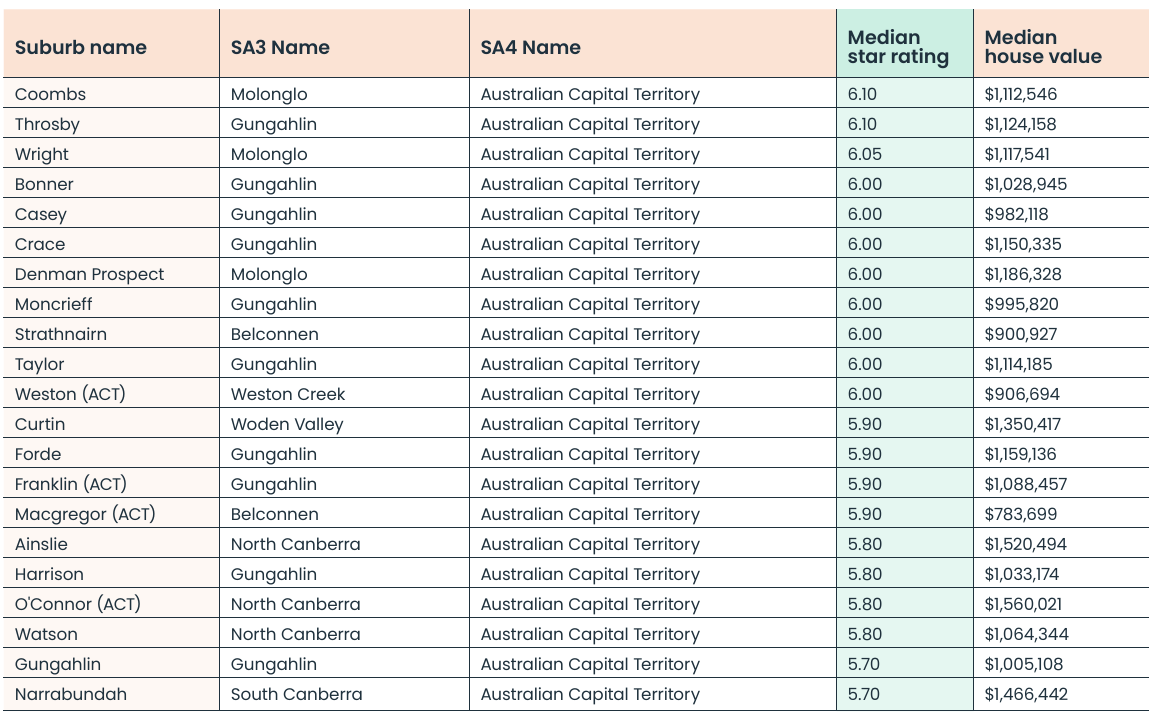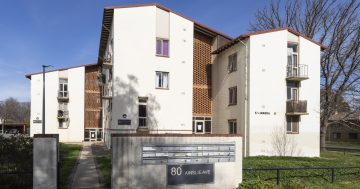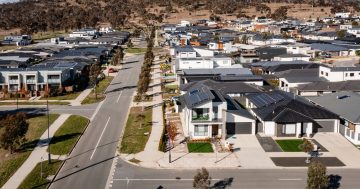
Housing in Coombs and Wright. A new report has found that homes in the Molonglo Valley are the most energy-efficient in the country. Photo: Michelle Kroll.
The Molonglo Valley has the highest median energy efficiency rating in the country, according to a new report from property data firm CoreLogic.
Amped Up: How energy resilient are Australian homes? found that the ACT leads the nation in energy-efficient homes, with six of its districts making the Top 30 list.
Molonglo, with its preponderance of new homes, leads the list with a median EER of 6.1 stars, the only one in the nation with a median star rating of 6 or higher across all dwellings.
Gungahlin is next at equal second with 5.8, followed by North Canberra (10) and South Canberra (11) with 5.7.
Weston Creek is equal sixth with 5.4, with Belconnen equal seventh at 5.3.
By suburb, Coombs and Throsby lead the way with 6.1, while Gungahlin and Narrabundah have the lowest rating of 5.7.
Early adoption of new building standards, government incentives and climate change policy are driving the high energy efficiency ratings.
The report says the ACT has been quick to take up changes in the National Construction Code (NCC), which have made a significant difference in energy rating standards since 2010.
The report says that a typical home built in 2010 or later is twice as energy efficient as a home built before 2010.
The Coalition has promised to put the changes on ice if it returns to the government, arguing they are too costly for builders in the current economic environment.
ACT Government schemes such as the Energy Efficiency Improvement Scheme, in which electricity retailers help households save energy, and the Sustainable Household Scheme which offers interest-free loans to make a home more energy efficient, are also having a positive impact.
Since last year, rental homes in the ACT must also meet minimum insulation requirements.
These initiatives are part of the government’s nation-leading climate change strategy, which aims to achieve zero net greenhouse gas emissions by 2045.
The report uses metrics generated from CSIRO’s RapidRate AI tool and CoreLogic data inputs to show that homes built after 2010 achieved an estimated median star rating of 5.9 out of 10, compared with a median of just 2.8 stars for homes built before 2010.
The best-performing areas are concentrated in regions with newly built housing. Sydney and Hobart were the only capitals unrepresented in the Top 30.
Across the broad regions of Australia, the median star rating for homes built before 2010 ranged from 2.3 in Hobart and Regional Northern Territory to 3.6 in Regional Victoria.
In contrast, the lowest median star rating for homes built from 2010 or later was 5.3 in Sydney and Regional NSW and as high as 6.4 in Darwin.
Victoria and South Australia scored well, with six and five regions represented on the table.

CoreLogic’s Head of Banking & Finance Solutions Tom Coad said the report’s findings demonstrated the importance of minimum standards in the NCC, with residential buildings making up 24 per cent of overall electricity use and more than 10 per cent of total carbon emissions in Australia.
“The significant difference in energy efficiency between relatively modern homes and older homes can largely be attributed to changes in the NCC, which has progressively placed more emphasis on energy efficiency requirements for newly built homes,” he said.
“The Coalition’s recent push to pause the National Construction Code for 10 years flies in the face of Australia’s commitments to reduce carbon emissions.
“Policymakers should be incentivising the construction of energy-efficient buildings, not slamming the brakes.”
CoreLogic research director Tim Lawless said it was increasingly important to measure energy resilience in our housing stock in Australia’s housing stock.
“Minimum energy efficiency standards for new builds will continue to be important in supporting Australia’s greenhouse gas reduction targets, but there is likely to be increasing focus and incentives on established housing where most of Australia’s housing stock was built prior to recent minimum standards,” he said.
“Many European countries are well advanced in their data collection and analysis of energy efficiency data, with the European Union mandating an Energy Performance Certificate (EPC) must be obtained when homes are built, sold or rented.
“This is also the case in the United Kingdom and some Scandinavian countries.”
The report says retrofitting older homes with more energy-efficient elements, such as better insulation and glazing, as well as modern energy-saving appliances, will boost energy ratings over time.





















